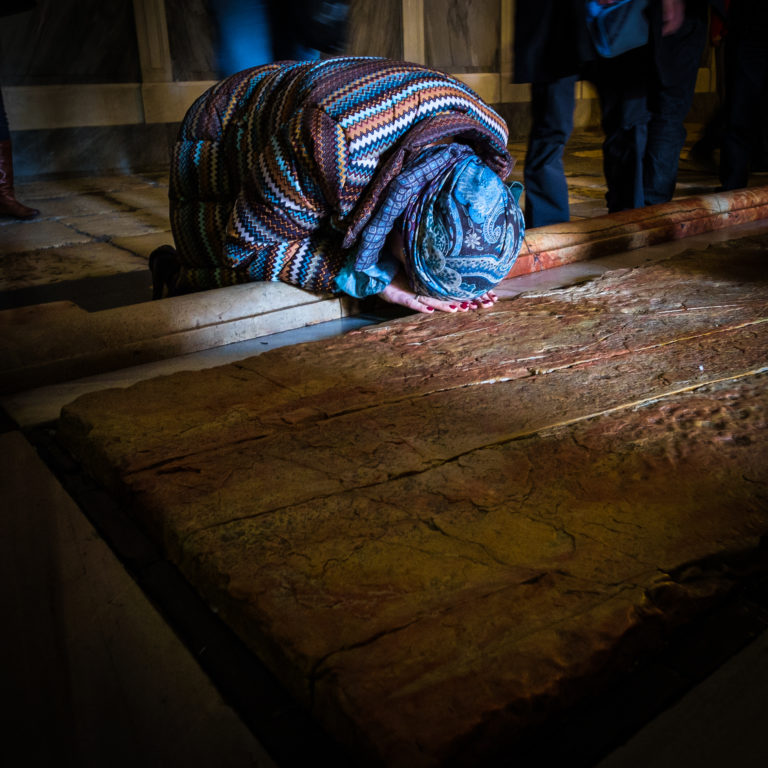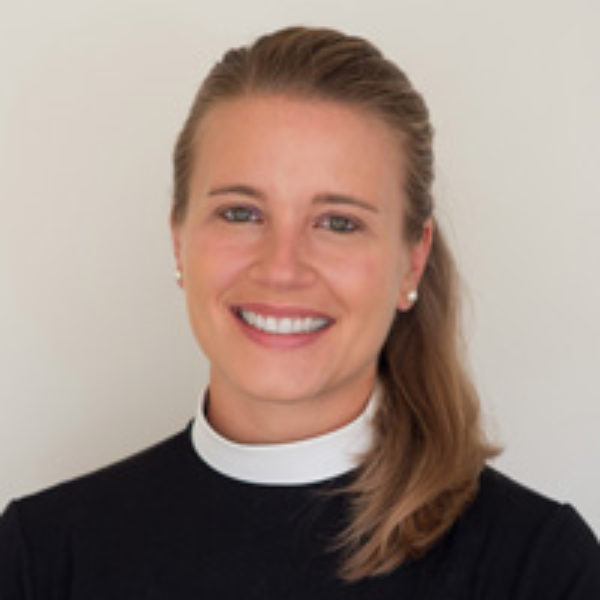
A woman prays at The Stone of the Anointing inside The Church of the Holy Sepulchre in Jerusalem. Image by Jon Bush/Flickr, Some Rights Reserved.
All in the (Abrahamic) Family
In John’s gospel, the wedding at Cana is the first of Jesus’ seven miracles — the first time he “reveals his glory.” Weddings are lovely and all, but I’ve always wondered: Why here? Why in the world would God Incarnate’s first miracle involve something as seemingly trivial as making sure a wedding reception had enough cabernet to go all night?
It’s curious how little information John gives us about the wedding. There’s no mention of who is getting married. No details about the families. No commentary on the bride’s edgy accessories or the reception’s color scheme. But this is clearly not a casual, come-as-you-are affair. The passage mentions servants, and stewards, and enough water for the purification rites of many, many guests. (Think Downton Abbey with footmen and ladies maids, butlers and under butlers, all rushing about to make sure everyone’s needs are met.)
In Jesus’ time, marriages celebrated like that were rarely a matter of love. They represented the joining of two families into one. An alliance. Marriage is and always has been about more than the couple at hand. It is a social arrangement that, at its core, involves reconciliation between previously distinct, even divided, communities.
And reconciliation is such a tremendously faithful and courageous thing that, for centuries, the Church has called marriage a sacrament: one of the mysterious ways in which God’s transformative grace is manifest in ordinary lives. God’s reconciliation of all people represented in the union of two.
In practice, marriage is not always bliss. In the best of cases it involves hard work and sacrifice buoyed by the hope and comfort of companionship.

In my first semester of college, I stumbled into a graduate seminar called “Intro to Islamic Civilization.” It was taught by a brilliant American fluent in Arabic, Farsi, and Sanskrit, whom I learned was also an Episcopal priest. Having spent the first 17 years of my life in suburban Ohio, I knew nothing about Islam. I don’t know that I’d even heard the word until my senior year in high school, when the twin towers fell. When I got to college, I knew enough to know I didn’t know anything at all.
Though I remained a practicing Episcopalian, I quickly fell in love with Islam. I built a religion minor out of that passion and spent two years learning Arabic. I studied abroad in Turkey and West Africa. I learned that Islam traces its heritage back to Abraham, just as Christianity and Judaism do.
I learned that Muslims affirm five “pillars” of faith, all of which should sound extremely familiar to Christians: a declaration of faith, daily prayer, fasting, charity, and pilgrimage. Muslims uphold the New Testament and the Hebrew Scriptures as sacred texts, revere Jesus as a great prophet, and his mother, Mary, as a saint. Having learned Arabic, I could read parts of the Qur’an, which says “surely those who believe, and those who are Jews, and Christians … whoever believes in God and the Last Day and does good, they shall have their reward from their Lord.”
I got a glimpse from several brilliant students about what it means to be a strong, educated, and deeply faithful Muslim woman. I heard from scholars around the world about the many and nuanced ways in which Islam wrestles with secularism and various social issues. I learned that it would be no more accurate to say every Muslim is an extremist, even if the only extremists I saw on TV were Muslim, than it would be to say every Caucasian male is a serial killer, even though most serial killers actually are white males.
Mostly, over all those years and all those conversations, all those trips and all those friendships, I learned that Muslims and Christians aren’t simply neighbors. We are in-laws. Step-siblings. Not-so-distant cousins. We are family.
So when I sat next to a nice enough looking man from Pakistan on an airplane a few years ago, and he mentioned that he was Muslim, it actually felt more like we had something in common than a chasm between us. I went on to start a family with that guy. I share all this because in recent months there’s been a rise in Islamaphobic rhetoric among political leaders here in the U.S., much like what we saw after 9/11. This is deeply concerning to me because of my marriage, but it also deeply concerning to me as Christian, and even more so as a priest in the Episcopal Church.
Islam and Christianity have a complicated, 1400-year history, one all too often marked by profound misunderstanding and violence on both sides. This is an appropriate moment to remember that reconciliation — hanging together in hope, working toward fruitful relationship — is the central work of the Church. We practice reconciliation when we refuse to separate ourselves from others we don’t know or understand; when we insist on a more honest view of the world, even if it’s a more complicated one; when we pray for and move toward forgiving those who have hurt us; when we are kind and merciful toward our neighbors, our colleagues, our friends, and ourselves. We do this imperfectly, because we are human, but we must do it nonetheless.
While on pilgrimage to Jerusalem years ago, I visited the Church of the Holy Sepulchre, a massive, sprawling, sacred space built upon both the site of Jesus’ crucifixion and the cave in which he was buried. In Arabic, it is known as The Church of the Empty Tomb, because, as countless Palestinian Christians were eager to tell me, the place is sacred not because his tomb is there but because his body is not.
As my group navigated winding walkways and various shrines, our guide paused to point out how many Christian denominations had laid claim to parts of this building and what terrible tensions it had caused. At one point in the Middle Ages, the acrimony between Christian sects became so intense that denominations could not trust one another to grant access to the building. And so a respected Muslim family was entrusted with the keys to the most sacred site in Christendom. For hundreds of years, the keys to that Church have been handed down through this family, who to this day open the gates every morning.
Our salvation depends on one another. We can’t even enter the gates of our sacred sites alone, let alone the gates of heaven. We can choose to see this as a tragic mistake or a generous, joyful invitation.
In his first miracle, Jesus says yes to the underlying hope of reconciliation for which marriage stands. Yes to the end of divisions between families. Yes to drawing the circle wider, trusting more deeply, dreaming more boldly — together. Every time we choose that path, I find Jesus, making something special out of our simplest offering, turning water into wine, promising to keep the celebration going for all eternity, with a glass of merlot outstretched to welcome you home.

